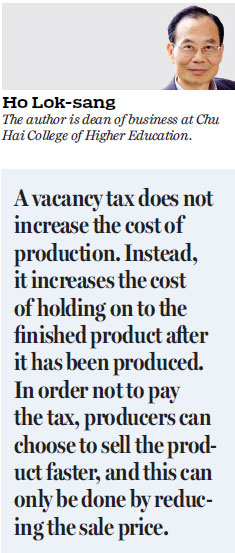Proposed vacancy tax could deliver perverse outcomes
Updated: 2018-06-26 07:12
(HK Edition)
|
|||||||
Ho Lok-sang says levy on empty homes might have little impact on home prices but may lead developers to concentrate on smaller units
The Hong Kong Special Administrative Region Government is reported to be seriously considering a tax on vacant homes. However, it is also understood that the tax will only be levied on completed properties held by developers. Levying the tax on existing homes is believed to be administratively more difficult and also likely to encounter more objections.
The government had, earlier on, quoted a figure of 9,000 units in the hands of developers that may attract the tax. A Real Estate Developers Association official said this was certainly an overestimate. He said the 9,000 unit assessment was based on those the Buildings Department had cleared as fit for human occupation. But such units may still not be available for occupation, as developers will still need a Lands Department Certificate of Compliance before they can advise buyers that the flats are ready to be taken up.
In any case, official statistics show that the private domestic residential vacancy rate has been hovering at about 3.7 percent to 3.8 percent in the past few years. This is considered rather low. Indeed, such a low vacancy rate suggests the housing market is indeed very tight, with demand outstripping supply. This is the main reason behind the surge in housing prices over the past few years.

Actually, the prices and rents of other types of properties have all risen faster than those of homes, suggesting the shortfall in home supply is only part of the picture. The undersupply of buildable land over the past decade and beyond is coming home to roost. This shows the urgency of increasing land supply for Hong Kong.
The very low vacancy rate suggests a vacancy tax is unlikely to have a noticeable effect on housing prices. But will it have an effect at all? And will it cause a perverse effect, as quite a few commentators suggest?
Some commentators say a vacancy tax will have a perverse effect, because a tax is a cost. Higher costs will be passed on to buyers, they say, so homes will be made even more costly.
I venture to say this analysis is all wrong. A tax can be shifted only if it increases the cost of production and reduces supply. As supply is reduced, consumers and producers will both be hurt. Consumers pay a higher price. Producers take a lower income through a smaller net price after the tax on top of a smaller quantity sold.
A vacancy tax does not increase the cost of production. Instead, it increases the cost of holding on to the finished product after it has been produced. In order not to pay the tax, producers can choose to sell the product faster, and this can only be done by reducing the sale price.
However, economist Francis Lui made a good point. He said that if completed units are sold faster now, fewer units will be available in the future. The shortage in the future will be more acute. So if there is any favorable effect on spot prices today, the cost may well be a sharper price rises down the road.
Lui observes that if developers have better market sense than government officials, any restriction on supply today will actually serve to make supply more ample at a future time when shortage becomes particularly acute, and that will be good.
Lui is completely correct if developers' choice is between selling now and selling later on, so total sales over a longer period remain the same. But if developers have monopoly power, in theory it is possible that developers indefinitely restrict supply so total sales over a longer stretch of time remain restricted.
This is possible but the fact that the overall vacancy rate is so low suggests there is little sign that developers significantly restrict supply. The vacancy tax may indeed increase supply but the impact on prices is likely to be unnoticeable, unless the policy succeeds in impacting on market psychology. This possibility, though rather unlikely, cannot be ruled out.
There is also the worry that the tax may lead to more monopoly power as it could hurt smaller developers more. If smaller developers are driven out by the tax, the larger developers may well wield even more market power. Buyers will have a smaller choice and market efficiency could fall. There is rumor that the government may well impose a vacancy tax equal to two years of ratable rental value.
Such a tax is going to have a big impact. Because larger flats that are very pricey will generally take a longer time to sell, the tax may well reduce the incentives of developers to produce very high-end units. The supply of bigger, pricier units will then fall, while that of smaller units that cater to the mass market may rise. It may well trigger a price rise in luxury flats and a price decline in smaller flats. These are the possible consequences that we should consider before making a decision.
(HK Edition 06/26/2018 page8)